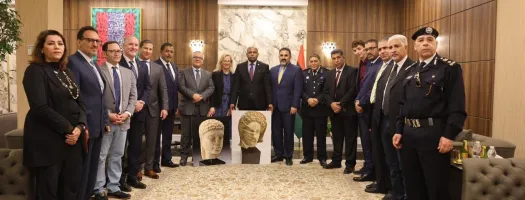On 31 March 2022, in Tripoli, we celebrated the homecoming of several Libyan priceless cultural artifacts. The event represented an important first step in Libya’s recovery of assets illegally removed from the country.
The return of illegally removed assets, especially cultural antiquities, is a highly complex endeavor which requires the involvement of many key actors. National and international entities have joined UNICRI over the years to achieve the common goal of returning assets located abroad, thereby preserving the cultural heritage of Libya for the Libyan people.
The ceremony at the Royal Palace of Tripoli was attended by high-level officials from the Minister for International Cooperation and Organizations Affairs; the Libyan Embassy; the National Union of the United States of America; the Agency at the Libyan Embassy in Washington; the Committee of Esterdad for Looted Money and Property; the United Nations Support Mission in Libya (UNSMIL); the European Union and UNICRI, as well as by ambassadors from multiple embassies based in Libya and internationally-recognized archaeologists.
This landmark achievement was possible thanks to the coordinated efforts of the United States of America, the Libyan Asset Recovery and Management Office (LARMO), the non-governmental organization Bancroft Global Development, the French Archaeological Mission in Libya, and UNICRI.
American officials seized and confiscated these important cultural assets as part of wider extensive criminal investigations led by the Department of Homeland Security, Cultural Property Investigations. They thwart and deter international antiquities trafficking networks that plunder and traffic in priceless cultural heritage. These investigations have resulted in criminal convictions, extraditions, and thousands of seized antiquities. The Manhattan District Attorney’s Office, has, to date, returned more than 1500 antiquities around the world, including, significantly, these priceless antiquities today to Libya.
The Libyan Asset Recovery and Management Office (LARMO) coordinated the return of these stolen antiquities. UNICRI played a key role in the creation of the LARMO and has had the honor to work closely with its officials over the past few years, both to enhance its overall capacity and to assist it to develop effective cooperation with countries where Libyan assets have been located.
As the UN research and training institute in the field of criminal justice and crime prevention, UNICRI has assisted authorities in identifying a broad range of Libyan assets located abroad, including bank accounts, real estate, gold, diamonds and cultural assets, all with an estimated value of 54 billion US dollars.
The NGO Bancroft Global Development provided the flight and transportation of these antiquities from the United States to Libya, free of cost. This support is proof of the benefits of cooperation between Libyan governmental institutions and civil society actors, including the archaeologists who identified the origins of these smuggled cultural assets.
One of the repatriated sculptures is the Veiled Head of a Female, recovered from the Steinhardt collection in New York. It is dated to the 3rd century B.C. and is originally from Cyrene (modern-day Shahhat), Libya. Libyans consider this sculpture to be priceless, as it is an important piece of their cultural heritage.
Cultural rights are human rights and having access to their cultural heritage is a right of every people. Pieces such as these returned today speak a universal language and reflect the spirit, values, beliefs and history of the Libyan people. They cannot and should not be considered commodities to trade for profit on illicit or licit markets.
The European Union generously funds an anti-corruption project co-implemented by UNICRI and UNODC, through which UNICRI is carrying out asset recovery work linked to acts of corruption.
During the event, Antonia Marie De Meo, Director of UNICRI, underlined the centrality of asset recovery for human rights, development and the rule of law:
"All countries need to prioritize the seizure, confiscation and return of cultural assets to Libya and elsewhere. Extra efforts must be taken to preserve the cultural heritage of countries that have suffered from significant looting, often facilitated by endemic corruption and sophisticated organized criminal networks. War and instability also contribute to the plunder and desecration of cultural heritage. Conversely, one of the dividends of peace is the repatriation of cultural property.
Given the many high-priority development needs in Libya, we call upon the many countries in which Libyan assets are located to work closely with the LARMO to seize and confiscate stolen assets abroad, and to liquidate and safely return such assets to Libya. UNICRI stands ready to continue lending its specialized expertise to both the LARMO and the Attorney General’s Office, as well as foreign jurisdictions, to support these complex asset recovery processes.
Assets returned, transparently and safely managed, and used for the benefit of the Libyan people, will help the country to achieve its high priority development needs, such as in the healthcare, education, and justice sectors.
Today’s repatriation is a victory for Libya, as well as for international law enforcement and the rule of law. The European Union generously funds an anti-corruption project co-implemented by UNICRI and UNODC, through which UNICRI is carrying out asset recovery work linked to acts of corruption."
Ceremony for the Repatriation of Libyan Cultural Artifacts. Remarks by the Director of UNICRI, Antonia Marie De Meo:
